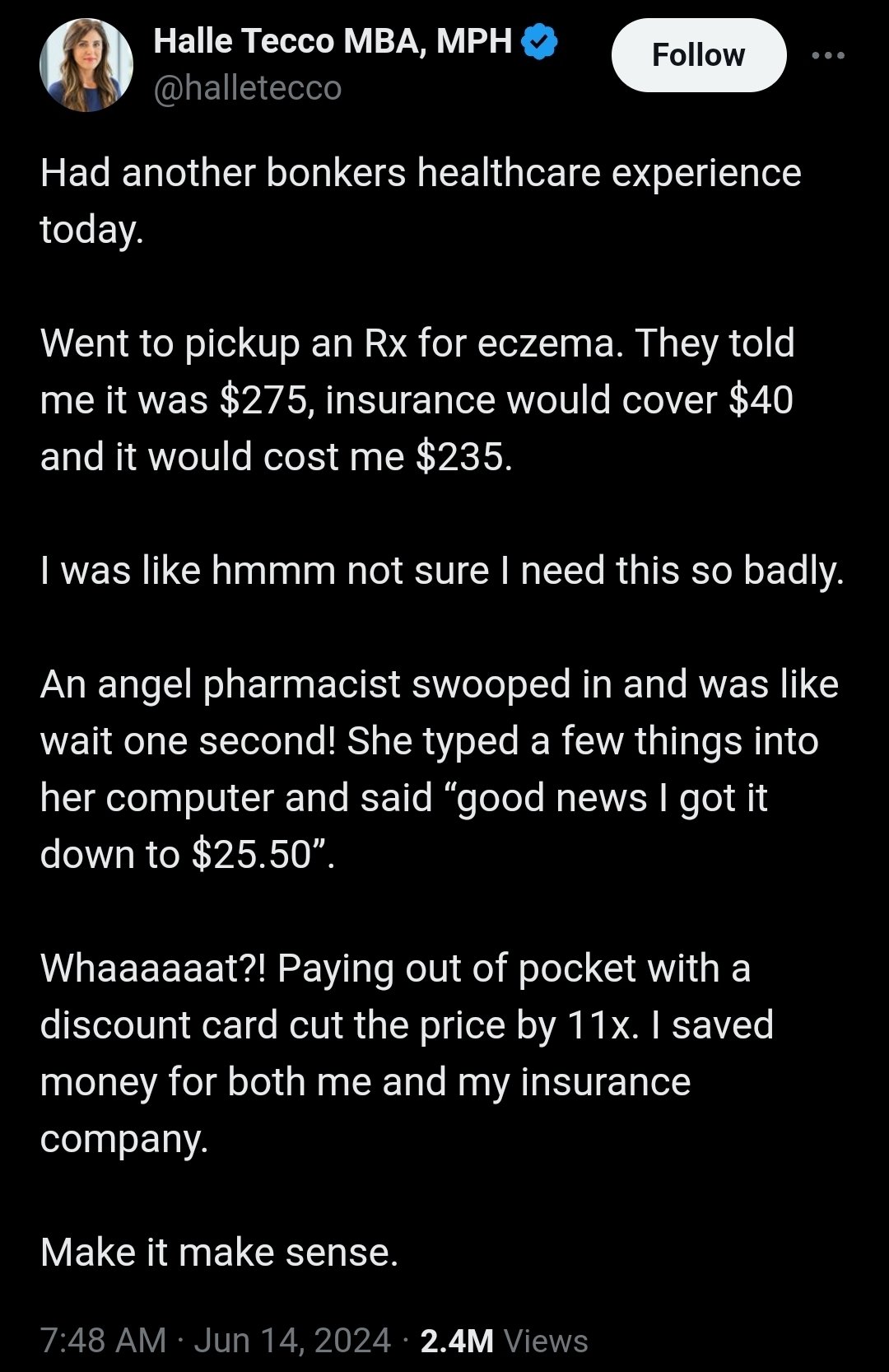this post was submitted on 15 Jun 2024
1363 points (99.1% liked)
People Twitter
4812 readers
2255 users here now
People tweeting stuff. We allow tweets from anyone.
RULES:
- Mark NSFW content.
- No doxxing people.
- Must be a tweet or similar
- No bullying.
- Be excellent to each other.
founded 1 year ago
MODERATORS
you are viewing a single comment's thread
view the rest of the comments
view the rest of the comments

What you meant to say is you can’t envision it happening.
Plenty of change has and will continue to happen in your life that you are utterly unable to fathom including ultimately like the rest of us, your own passing from this life.
We can have universal healthcare, if it feels impossible it is because we have been specifically trained to feel that it is impossible.
Tell you what, I will say that Universal Healthcare will become a reality when the U.S. is completely out of debt and back to surplus (lack of a better term).
But we have an upcoming problem. The petrodollar is officially dead (okay more like dying, realistically). The Saudi's have refused to renew the petrodollar contract with the U.S. Now in the future this could be reversed and somehow we're able to get Saudi Arabia back on board with that contract, or... we will face a slow death of the U.S. dollar. And as long as more and more countries unite with BRICS, the more and more the dollar will come to its impending doom.
As for the outcome.. I can't comprehend it. I have no idea what's to come. I can only imagine that the U.S. will try to enforce imaginary money - CBDC which will have a lot of resistance (I sure as fk don't want CBDC, I don't need government tracking how/where/when I use my money).
Not trying to get off topic, btw.. just saying that Universal Healthcare is more than likely not ever going to happen in the U.S. and why that may be the case.
The only thing to know for sure is that, in the face of ever diminishing returns, those heavily invested in the status quo will fight like hell to keep what they have. Scary thing is: those same people have the money to do so. I suspect that means lots of law, policy, and other maneuvers to maintain this system even if it's on the way out. Best case: we manage to shift the US economy to some other growth sector like renewable energy. Worst case: the US military gets mobilized to make that happen.
https://www.investopedia.com/terms/c/central-bank-digital-currency-cbdc.asp
I honestly see this as an evolution of what the Federal Reserve already does - a huge amount of what happens between banks, the stock market, and the reserve is all digital right now. This just gives those transactions the same standing as fiat. What I really don't like is that this definition on Investopedia makes no reference to "privacy" in the stated properties of CBDC. Were this pushed down into the rest of the economy, your concerns about tracking are entirely valid.
I see the argument, but outside substantial and powerful investment in the current system, I don't agree. I don't think federal debt or surplus has any bearing on the viability of universal healthcare. Instead, I honestly think it comes down to the existing insurance providers and the political power they hold. What we're talking about here is relegating those companies to mere federal contractors, while nationalizing the role and responsibility of the top of those organizations. That means investors, boards, C-level people, upper management, everyone running that private sector will make less money. And that's the case even if you stand up a national health service in parallel with the current system; the nationalized service will simply take business away. And the mere threat of this causes the would-be losers in that shift to fight like hell to keep what they have; that means political action, corruption, etc.
Short of electing people with the political will to make this shift, and weather the blowback from powerful insurance companies, I can see only one other way through: somehow nationalize the current healthcare system while keeping the current power structures intact. Effectively, handle it like an acquisition or merger. This gives people a sweetheart deal: federal job security and private sector pay, without the risks presented by competition. Then, follow up with a 50 year plan to consolidate and collapse said power structures - enough time for the fat cats to age out of the whole mess. Yeah, it'll take a lot of nose-holding to get done, but engaging with everyone's sense of greed has got to be easier than the alternatives right now.